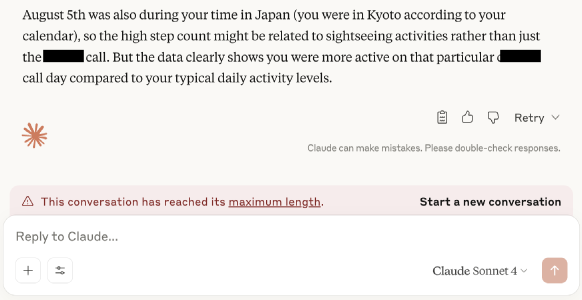MCP and NDCs
Created on September 12, 2025 11:15 EDTImpressions of MCP
It took a few months, but I’m starting to see the MCP (Model Context Protocol) paradigm working in practice.
Now that example servers are more widespread, unlocking access to tools and data for which either no API existed, or for which the interfacing was too complicated for me to understand, I’ve been playing around with the LLM’s ability to construct a single narrative from several overlapping timelines.
This includes things like highlighting activity trends (from Apple Health) alongside a look into my calendar. I could combine this further with things like my infrequent journal, or other RSS feeds and activity to discover patterns between them. In the previous example, I appreciated the LLM noticing I was on holiday based on a calendar event while analyzing step count, and imputing that this probably had an exceptional effect on the numbers for that period.

These MCP servers as data connectors are not quite ready for the prime time yet, the functionality is piecemeal and hard to discover, as always via chat, and there’s a bit of fiddling around locally to get everything hooked up. I still wouldn’t trust it to do even simple things like send emails on my behalf, because it’s hard to only give it partial control before sign-off, but just sorting through unstructured data from all over already has many applications, and really is still the basis of AI today.
On NDCs
In the sustainability area, I continue to be struck by the distance between the goal setting at the top and individual perception. There are Net-Zero Alliances and pledges out there with levels of intensity, important and necessary for mitigating business risks, but talk of Scope 1-2-3 and Paris Agreement alignment might sound vague to a consumer*. Even without being a climate denier, what do those committments mean in practice?
The Paris Agreement to limit global warming to 1.5C above pre-industrial levels signed in 2015 provided that each state should come up with NDCs (Nationally Determined Contribution) to coordinate international response, and repeat this exercise every 5 years, with the COPs (Conference of Parties) serving as the regularly scheduled meetings to track progress and attendant tasks in parallel.
National environmental ministries all duly submitted their overviews, fulltext search here, but they are more strategic memos and leave a lot of the implementation “off the page”, as it were.
At the same time, target-setting bodies such as SBTi (Science-Based Targets initiative, predating the Paris Agreement in 2014!) have come up to try and provide rigorous guidance on what corporates should do. This is where CO2 emission scopes 1 to 3 come into play, with specific accounting and emission measurement standards. The further good thing in defining these is that governments eventually pass regulations based on them. Given the large number of organisations that constantly update their strategy, there is a lot of communication and efforts in (re)aligning everyone, according to very specific definitions that can be hard to pin down. So, mentioning the “Paris Agreement” on its’ own in a communication doesn’t cover much without the broader context.
Putting them together
The big application would be to use LLMs et al. to remove friction in following the regulations, complying with reporting and proposing further concrete committments to take on all while ameliorating business efficiency. As we are in a world where it is reported that 95% of GenAI projects are failing to deliver measurable returns, mainly due to the learning gap, the argument that it doesn’t make financial sense is somewhat diminished… and countries like Albania are starting to test slightly wacky ideas in AI government – whether or not this is really sophisticated rather than a FedEx-style chatbot, it still shows an interest in imagining what’s possible and an optimism that is worth inspiring oneself by.
For now, apart from the chat applications themselves, productized applications of AI are LLM-augmented search stuffed into Google and Microsoft and meeting transcribers, both variyingly useful. One line of questioning I have recently used is to ask “why”, which returns a “because” answer, more rarely indexed as such online.

[*] Northwind Climate (invested) have done some great work in this area!